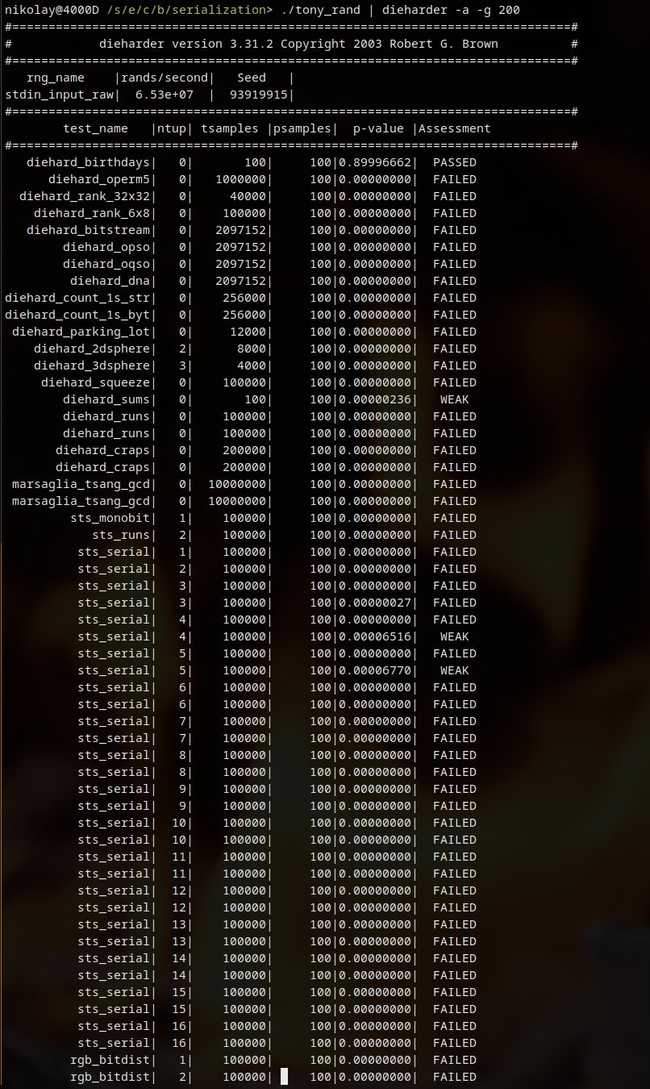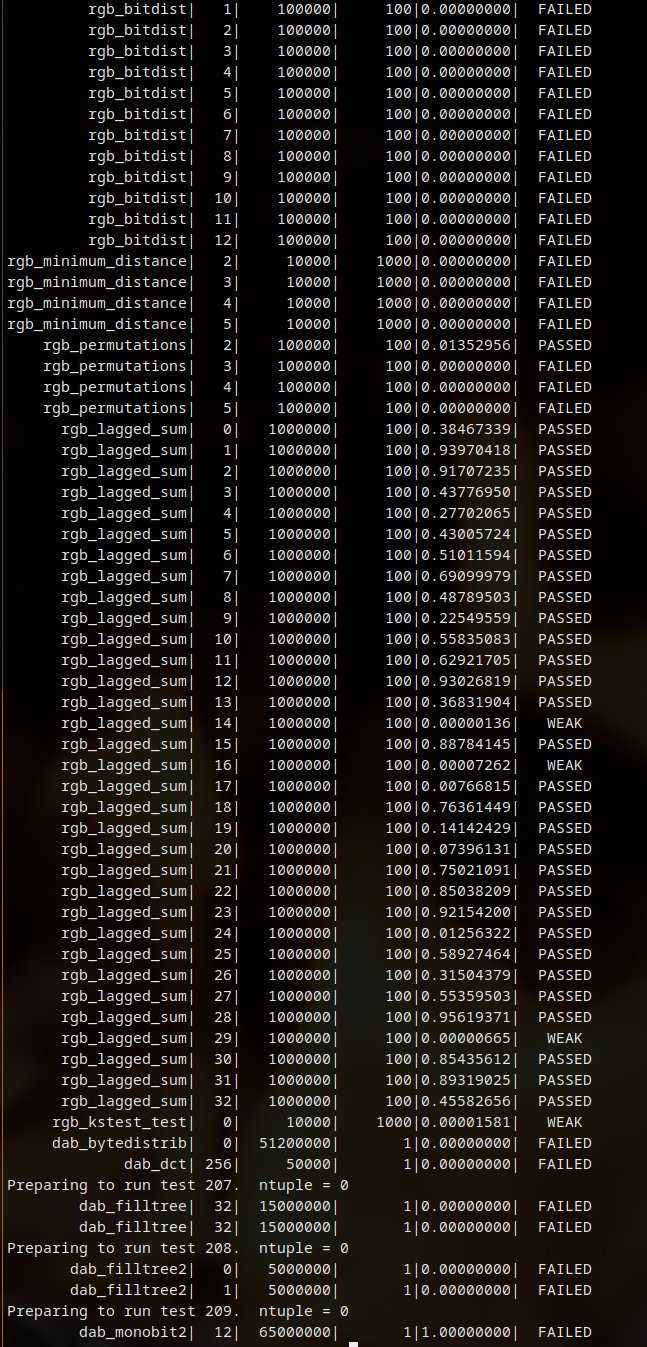Biased scaling
First things first. How to find a bias in random number generator? But not that bias that all statistical tests search for in a stream of 32 bit numbers, but the bias after scaling.
This article, Bounded rands is the answer. It also will explain how to avoid biased scaling.
It's based on this paper, Fast Random Integer Generation in an Interval by Daniel Lemire which also has great insights.
Let's check the Isaac RNG implemented in Javascript (original repo, npm package repo). The JavaScript implementation and the original C implementation from the official website looks similar. Also it produces the same sequence when they start from the same seed.
function random(){
return 0.5 + this.rand() * 2.3283064365386963e-10; // 2^-32
}Here this.rand() returns a random integer value in range [0, 2^32), then we divide it to convert it into a double (See paragraph FP multiply in the article).
0.5 is a fix for uint representation in JavaScript.
And this method probably in every browser and MDN warns you:
If extremely large bounds are chosen (2^53 or higher), it's possible in extremely rare cases to reach the usually-excluded upper bound.
And let's assume that you are going to generate a random value in a range by this code
// return random value from [a, b) range
const random = function(a, b) {
return a + Math.floor(isaac.random() * (b - a));
};Surprisingly, this is very common way to do it in the JavaScript world.
So here is the way to properly use the isaac library implementing the OpenBSD algorithm
:::note
The code for OpenBSD's arc4random_uniform (which is also used on OS X and iOS) adopts this strategy.
:::
const max_uint = 0x100000000;
const rand_uint = () => {
const r = isaac.rand();
return r < 0 ? r + 0x100000000 : r; // fix uint representation in JavaScript
}
const rand_in_range = (range) => {
let result = rand_uint();
const working_range = max_uint - (max_uint % range);
while (result >= working_range) {
result = rand_uint();
}
return result % range;
}
const random = function(a, b) {
return a + rand_in_range(b - a);
};Reference
- More comments about the article https://stackoverflow.com/questions/61107920/how-does-bias-manifest-in-bounded-random-number-generation
- Some theory Random Number Generation by Chris Lomont http://lomont.org/papers/2008/Lomont_PRNG_2008.pdf
- From Daniel Lemire's website https://lemire.me/blog/2016/06/27/a-fast-alternative-to-the-modulo-reduction/
- Maybe a good read: Design Flaws in the Implementation of the Ziggurat and Monty Python methods (and some remarks on Matlab randn) https://arxiv.org/pdf/math/0603058.pdf
- The Debian PGP disaster that almost was https://rdist.root.org/2009/05/17/the-debian-pgp-disaster-that-almost-was/
- A Primer On Randomness https://espadrine.github.io/blog/posts/a-primer-on-randomness.html
Plot the error
Anatomy of a pseudorandom number generator – visualising Cryptocat’s buggy PRNG
plot "chi-square.300.fixed.txt" w linesp, "chi-square.300.txt" w linesp- https://nakedsecurity.sophos.com/2013/07/09/anatomy-of-a-pseudorandom-number-generator-visualising-cryptocats-buggy-prng/
- https://bic-berkeley.github.io/psych-214-fall-2016/arrays_and_images.html
Test suites
TestU01 / BigCrush
- http://simul.iro.umontreal.ca/testu01/tu01.html
- Test javascript in testU01 (by compiling the test suite with Emscripten) https://jtobin.io/crushing-isaac
- testing popular random-number generators https://github.com/lemire/testingRNG
Dieharder
isaac_test.js
isaac.seed([0]);
function delay(time) {
return new Promise(resolve => setTimeout(resolve, time));
}
while (true) {
const r = isaac.rand();
const v = r < 0 ? r + 0x100000000 : r; // fix uint representation in JavaScript
process.stdout.write(v + '\n');
await delay(1);
}numbers-to-stream.cpp
#include <cstdint>
#include <iostream>
#include <limits>
constexpr auto max_size = std::numeric_limits<std::streamsize>::max();
int main(int argc, char const *argv[])
{
uint32_t input_number = 0;
while (true) {
std::cin >> input_number;
if (std::cin.eof() || std::cin.bad()) {
break;
} else if (std::cin.fail()) {
std::cin.clear(); // unset failbit
std::cin.ignore(max_size, '\n'); // skip bad input
} else {
char c = (input_number & 0xFF000000) >> 24;
std::cout << c;
c = (input_number & 0x00FF0000) >> 16;
std::cout << c;
c = (input_number & 0x0000FF00) >> 8;
std::cout << c;
c = (input_number & 0x000000FF);
std::cout << c;
}
}
return 0;
}node isaac_test.js | ./numbers-to-stream | dieharder -a -g 200Here's the result with ISAAC seed = 0. One test is marked as WEAK for this seed, but it passes on another seed.
#=============================================================================#
# dieharder version 3.31.2 Copyright 2003 Robert G. Brown #
#=============================================================================#
rng_name |rands/second| Seed |
stdin_input_raw| 6.37e+05 |2933234618|
#=============================================================================#
test_name |ntup| tsamples |psamples| p-value |Assessment
#=============================================================================#
diehard_birthdays| 0| 100| 100|0.08296096| PASSED
diehard_operm5| 0| 1000000| 100|0.90920381| PASSED
diehard_rank_32x32| 0| 40000| 100|0.15277816| PASSED
diehard_rank_6x8| 0| 100000| 100|0.98528270| PASSED
diehard_bitstream| 0| 2097152| 100|0.06634944| PASSED
diehard_opso| 0| 2097152| 100|0.22866042| PASSED
diehard_oqso| 0| 2097152| 100|0.04849016| PASSED
diehard_dna| 0| 2097152| 100|0.64789513| PASSED
diehard_count_1s_str| 0| 256000| 100|0.95809155| PASSED
diehard_count_1s_byt| 0| 256000| 100|0.43858498| PASSED
diehard_parking_lot| 0| 12000| 100|0.51526020| PASSED
diehard_2dsphere| 2| 8000| 100|0.58505752| PASSED
diehard_3dsphere| 3| 4000| 100|0.94691424| PASSED
diehard_squeeze| 0| 100000| 100|0.66015259| PASSED
diehard_sums| 0| 100| 100|0.34256512| PASSED
diehard_runs| 0| 100000| 100|0.81029323| PASSED
diehard_runs| 0| 100000| 100|0.78271848| PASSED
diehard_craps| 0| 200000| 100|0.79607382| PASSED
diehard_craps| 0| 200000| 100|0.76686571| PASSED
marsaglia_tsang_gcd| 0| 10000000| 100|0.76298025| PASSED
marsaglia_tsang_gcd| 0| 10000000| 100|0.99609551| WEAK
sts_monobit| 1| 100000| 100|0.64468356| PASSEDCompare with this homemade bitshift generator
// By Tony Swain. all rights preservered.
//Nevermind you can have it, but you can't sue me.
// Actually just whipped it up for @Miklosan & @Mathicino
// **** Yet another random # generator. This one is designed for speed.
// compile gcc -o lrand lrand.c
// advantage; all done in inline and in register; zippidy do dah!
// No implied warranty, Based on code by Leo Schwab written a bazillion years ago.
#include <stdint.h>
#include <stdio.h>
#include <stdlib.h>
#include <time.h>
static uint32_t tRandomSeed=0;
static inline uint32_t lrand()
{
tRandomSeed <<= 1;
if(tRandomSeed & 0x80000000)
tRandomSeed ^= 0x80000000;
else
tRandomSeed ^= 0x1D872B41;
return tRandomSeed;
}
int main(int argc, char* argv[])
{
time_t lt = time(NULL);
tRandomSeed = (uint32_t)lt; // seed
union {
uint32_t value;
uint8_t stream[4];
} v;
while(1)
{
v.value = lrand();
for (int i = 0; i < 4; ++i)
{
fprintf(stdout, "%c", v.stream[4-i-1]);
}
}
return 0;
}- test through file (when your engine is in javascript) https://gist.github.com/blixt/9abfafdd0ada0f4f6f26
- about results http://www.bitbabbler.org/test-data/dieharder.html
ent
https://www.fourmilab.ch/random/
About PRNGs
rand()
- About rand() and modulo https://stackoverflow.com/questions/10984974/why-do-people-say-there-is-modulo-bias-when-using-a-random-number-generator
- How much bias is introduced by the remainder technique? https://ericlippert.com/2013/12/16/how-much-bias-is-introduced-by-the-remainder-technique/
- Bias in C# random https://fuglede.dk/en/blog/bias-in-net-rng/
- All scary stories about rand() is in the past, because (at least on Linux)
RAND_MAXis 2147483647. Check it for yourself https://en.cppreference.com/w/c/numeric/random/rand - RNG in every language https://rosettacode.org/wiki/Random_number_generator_(included)
Mersenne Twister
Mersenne Twister is very predictable. Here some steps to get it reversed.
ISAAC
Review of weak starting points.
Statistical tests
We are working with discrete uniform distribution (not continuous!) https://en.wikipedia.org/wiki/Discrete_uniform_distribution. Kolmogorov-Smirnov test works only with continuous distributions, so we have to use Chi-Square
Chi-Square test
- Chi-Square Goodness-of-Fit Test https://www.itl.nist.gov/div898/handbook/eda/section3/eda35f.htm
- critical values https://www.itl.nist.gov/div898/handbook/eda/section3/eda3674.htm
- https://stats.stackexchange.com/questions/408861/did-i-do-this-chi2-test-for-discrete-uniform-distribution-correctly
- https://stats.stackexchange.com/questions/502719/testing-uniform-distribution-of-a-discrete-function-derived-from-a-random-number
- ELI5 tutorial https://www.mathsisfun.com/data/chi-square-test.html
- calculator code https://www.codeproject.com/Articles/432194/How-to-Calculate-the-Chi-Squared-P-Value
Kolmogorov-Smirnov test
- https://daithiocrualaoich.github.io/kolmogorov_smirnov/
- https://stackoverflow.com/questions/37625280/kolmogorov-smrinov-test-in-c
- Biased into random: https://towardsdatascience.com/how-to-get-an-unbiased-rng-from-an-unbalanced-one-dbb44850e5f7
- how scientists prove that prng is biased https://arxiv.org/pdf/math/0603058.pdf
- test pairs https://math.stackexchange.com/questions/357672/density-of-sum-of-two-independent-uniform-random-variables-on-0-1
Boost
For quantiles use boost. Include it with cmake in this way. Strip the boost later.
Scaling and cryptographic strength
from Flaws of MT PRNG
(d) The scaling method may not compromise the cryptographic strength of the random number generator. The scaling method must preserve the distribution of the scaled values. For example, if a 32-bit random number generator with a range of the set of integers in the closed interval (0, 232-1) were to be scaled to the range of the set of integers in the closed interval (1, 6) so that the scaled values can be used to simulate the roll of a standard six-sided die, then each integer in the scaled range should theoretically appear with equal frequency. In the example given, if the theoretical frequency for each value is not equal, then the scaling method is considered to have a bias. Thus, a compliant scaling method must have bias equal to zero

